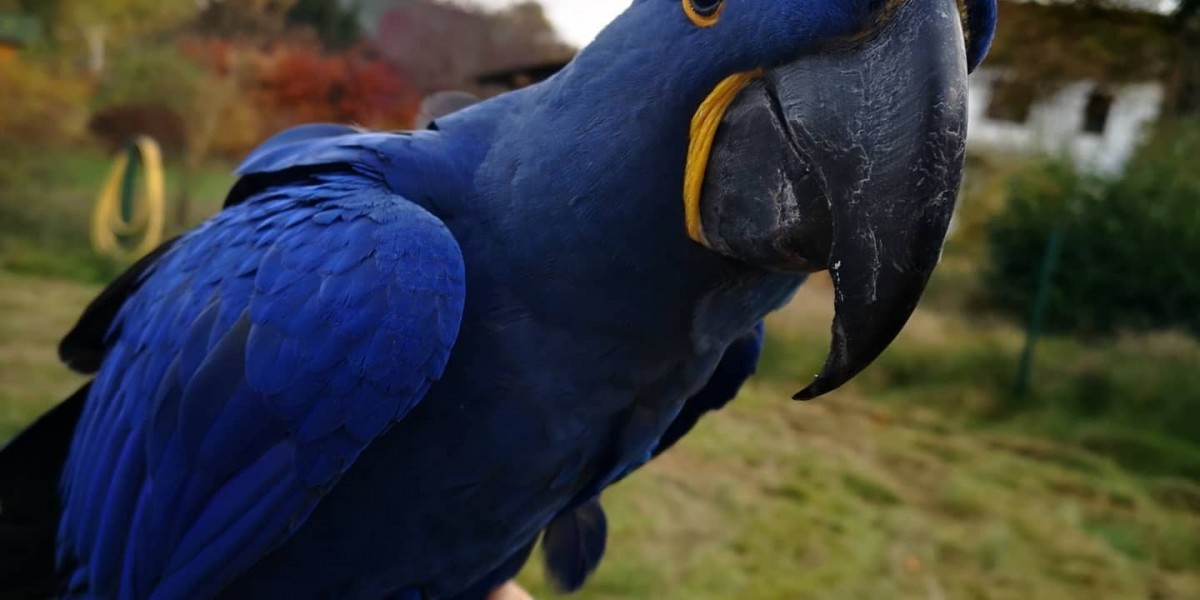The blue-and-gold macaw is a beautiful bird known for its stunning visual appeal. Its friendly personality makes it a perfect companion for families. It is also a natural at interacting and can learn the language and tricks quickly.
Our personal blue-and-gold macaw, Pteri, Buy-Macaw.Com can say hello to water, apple and more. They can live up to 50 years in captivity.
Lolita's Personality
Macaws are a wonderful companion bird. They are smart and affectionate. These birds are ideally suited to families with a variety of members. They can become bored quickly and discover ways to entertain themselves if their owners are not engaging with them enough often. Macaws who aren't properly socialized may become aggressive and may even bite. It is crucial that boundaries are clearly defined to ensure that the macaw doesn't feel threatened.
In general, Blue and Gold Macaws are lively birds who love to play, climb and interact. They need to spend at least two to three hours every day outside to stimulate their minds and get physical exercise. They love playing games, learning tricks and listening to music. They also enjoy playing in parks and playgrounds as well as hiking and going to local bars and restaurants. They are not just a wonderful pet, but they are they are also a great pet for children.
The birds can be quite loud, despite their adoration for them. They can also be a nuisance to people living near. They are capable of loud, ear-splitting calls and screech-calls which could be a problem in apartments and condos or near young children who might be scared by their roar.
Another interesting trait of this particular species is that it is monomorphic meaning males and females are hard to differentiate. For this reason, DNA testing is the only reliable method to determine the sex. Once sex is established, pairing the birds can be tried and breeding can begin.
Like all pets, Blue and Gold Macaws require training to learn commands, phrases and tricks. This isn't a simple process, and it's essential that the pet's owner has patience and understands that this isn't a task to be taken lightly. The use of positive reinforcement can help speed up the process and help to correct any issues with behavior.
Lolita's Care
Since the 1960s, activists have pleaded for Lolita to retire from performing tricks at Miami Seaquarium. They also would like her to be relocated to an open-water pen. After the 1993 movie Free Willy sparked public outrage over the reintegration of orca Keiko into the wild, activists believed that Lolita would suffer a similar fate. Sadly, she never had the chance to return to the ocean.
The captors of Lolita, referred to as the Dolphin Company, have ignored the advice of a veterinarian and continue to put her in danger. They harm her health by requiring her to perform for tourists. They over-exert her with high-speed circles and head-first diving, expose her to chlorine and cause her to lose weight. Additionally, they put her in a tiny tank that is just one-and-a-half times the size of her natural habitat.
In 2022, a new owner of Miami Seaquarium, who calls Lolita as a cousin of theirs, vowed to work on an arrangement with a group of Lolita supporters known as Friends of Toki, and the Lummi Tribe to transport her to open water eventually. The plan would have included a facility on Washington's west coast where she could live for the remainder of her life, receive human care and be monitored by researchers. The sanctuary pen was planned to be hundreds of time larger than her Miami home and be surrounded by ocean, not concrete tanks.
If the plan was successful, Lolita (also called Tokitae or Toki) could be alive. In the wild, killers whales are social animals and connect with their families until they die. Lolita who has been alone at Seaquarium in a cage for 40 years, is now being released into the wild. Activists from across the country have called for Lolita's departure from Seaquarium and then release into the wild. They include Ric O'Barry, a former Flipper trainer, Empty The Tanks, and Orca Network.
Lolita's Training
Our Macaws are smart and playful. They will bring joy to your daily life. They quickly learn and establish bonds with their caregivers. They have a long lifespan and are easy to train. This makes them a great option for families who are new to caring for a parrot. They can adapt to different environments and are an amazing display piece for any home.
Lolita San Miguel has always wanted to fulfill Joe Pilates' wish that everyone should be able to practice his method. To accomplish this, she developed an instructor training program that is the most comprehensive in the world. This program is known as Lolita's Legacy (tm). The first step is System I. System II builds upon the repertoire introduced in System 1 through exercises using equipment. It introduces teachers to exercises on the Spine Corrector and Magic Circle. This module comes with a manual, and a DVD featuring Lolita teaching you the System.
After graduating from Lolita's teacher training program you'll be able to teach the Pilates Method anywhere in the world! This program will prepare you to work effectively, safely and professionally with clients. You will gain a thorough understanding of all of the exercises and how they interact. You can apply this knowledge to any body, and help your clients feel secure, strong and confident. Lolita's Legacy produces open-minded teachers who have a thorough understanding of the Pilates Method and outstanding teaching skills. They also possess a passion for this remarkable exercise program that Joseph Pilates invented. After complete the four Systems, assignments and course hours, you will receive an education certificate signed by Lolita San Miguel.
Lolita's Diet
Like any species of animal, a captive gold and blue macaw's health is dependent on a healthy diet. These beautiful birds require high-quality food, as well as plenty of fresh vegetables, fruits, and whole grains. In captivity, a well-fed macaw can expect to live up to 60 years. Additionally, this magnificent bird requires plenty of room to fly around and exercise.
A golden and blue macaw is a delightful companion who is also very intelligent. They are renowned for their ability to learn new tricks and phrases quickly. This bird is a great choice for people who are just starting their journey to avian companionship.
This bird is also very social and will bond easily with her family members. Macaws of gold and blue are known to make loud screams, including "flock call" as part of their normal behavior. They may even squabble and chew on their food at times, especially when they're angry or bored. This type of behavior should be expected of prospective pet owners.
The Miami Seaquarium has released a series of information about Lolita's health and status but there are still questions. Some experts, including Akromas who was the one who trained or was in charge of the care of Lolita at some point, have raised concerns about her diet. The most recent update on the Friends of Lolita website states that she is eating about 115 pounds of salmon, capelin, herring, and squid every day.
 Miami Seaquarium, and in particular Lolita is being critiqued for the quality of food that they provide to their killer whales. The 57-year-old orca was rescued from Puget Sound in 1970, and while the species is endangered in the wild, she lives in an aquarium that some say is too small for her.
Miami Seaquarium, and in particular Lolita is being critiqued for the quality of food that they provide to their killer whales. The 57-year-old orca was rescued from Puget Sound in 1970, and while the species is endangered in the wild, she lives in an aquarium that some say is too small for her.Lolita's Health
While her beauty is unquestionable Lolita's health continues deteriorate. Her health has been a cause of concern for animal welfare groups that wish to see her returned to the wild. Lolita has been living at the Miami Seaquarium since 1970 and has been an attraction for tourists for many years. She has been battling chronic illnesses and a debilitating illness that has left her in a fragile condition.
The Dolphin Company, which now owns the Miami Seaquarium and is owned by the Dolphin Company has not provided any information regarding the condition of Lolita. However, the non-profit organization Friends of Toki has provided monthly updates about her health and well-being on their website. These updates indicate that Toki is aging quickly and her health is declining.
Since her captor doesn't have to disclose this information, it is not clear what specific health issue the orca is suffering from. The Orca Project created a repository of necropsies taken from Sea World. This shows that kidney disease is often an important part in the deaths of orcas kept in captivity.
Despite the continuing health concerns of Lolita, many people believe that she could be closer than ever before to a wild life. Seaquarium's new owner Seaquarium has stated his commitment to relocate the whale out of her tank into her native waters in the Pacific.
The decision comes after years of public pressure, including from PETA and PETA, which demanded that the Miami Seaquarium release Lolita into an ocean-side sanctuary where she can swim in the ocean, and possibly even meet the orca believed to be her mother. Sadly, these plans came too late for the beloved whale who died on Friday of what was believed to be a kidney issue.







